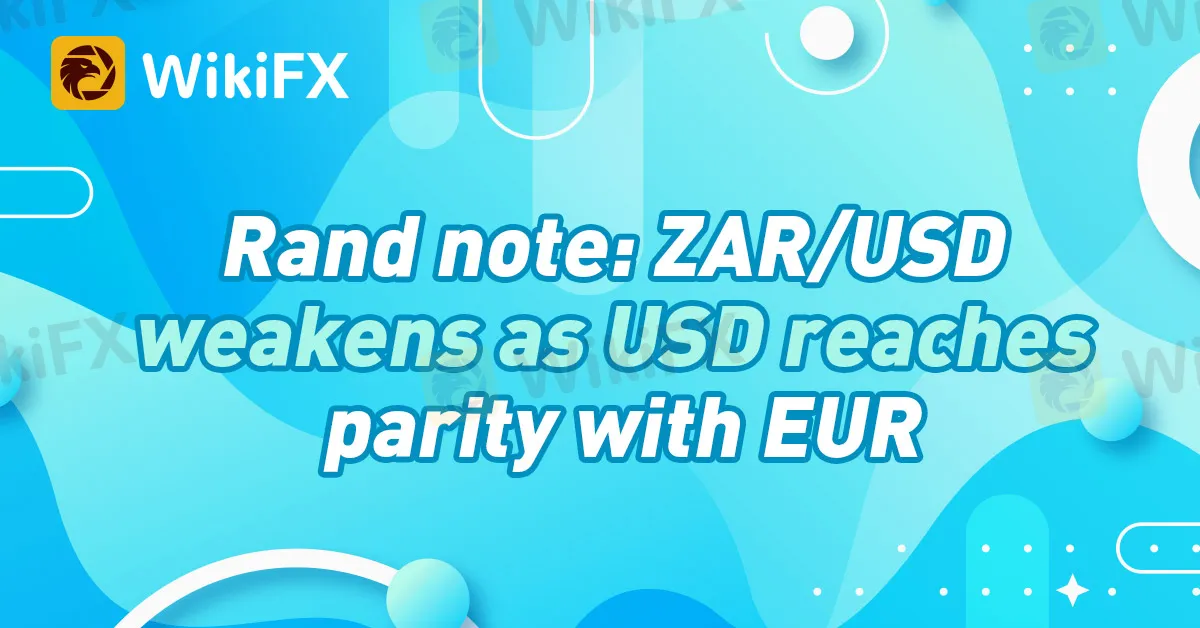简体中文
繁體中文
English
Pусский
日本語
ภาษาไทย
Tiếng Việt
Bahasa Indonesia
Español
हिन्दी
Filippiiniläinen
Français
Deutsch
Português
Türkçe
한국어
العربية
Rand note: ZAR/USD weakens as USD reaches parity with EUR
Abstract:The rand is now trading at 17.03/USD (up from R16.97/USD on Friday), and due to the US dollar's strength, it is now almost at parity with the euro at R17.17/EUR. The local currency is not being helped by negative perceptions of both internal and foreign events.

The rand is now trading at 17.03/USD (up from R16.97/USD on Friday), and due to the US dollar's strength, it is now almost at parity with the euro at R17.17/EUR. The local currency is not being helped by negative perceptions of both internal and foreign events.
With net flows of -R0.1bn, foreigners continue to be net sellers of SA government bonds this quarter. Last week, R4.3 billion was sold in only two days, compared to R3.6 billion throughout the course of Q2.22.
The rand often performs poorly in the second and third quarters of the year because senior traders in risk assets, such as EM currencies and portfolio instruments, frequently take summer vacations.
Fears of excessive interest rate rises, which might send nations into recession, are gradually taking the place of market worries over rising inflation, and risk sentiment on international financial markets is fragile and markedly risk adverse.
The revelation on Friday of stronger than anticipated US jobs numbers and a stable 3.6 percent unemployment rate has increased market concerns about more sharp US rate rises throughout H2.22—an additional 175bp increase, according to FOMC member projections.
The markets are generally in line with the FOMC statement since they anticipate an 185bp increase. Market participants are concerned that the rate increases, which will push the fed funds rate well over its neutral level, could stifle economic expansion.
Significant load shedding has harmed SA's domestic growth prospects, which might have a detrimental effect on state tax collections. The severe stage 4 and stage 6 power outages have reduced company productivity, and the intense pressure that unions have placed on Eskom, the state-owned electrical utility, is seen negatively from both a political and an economic one. The 2024 ANC electoral conference has increased political commotion in South Africa generally, which is likely to worry investors even more. The state capture faction of the ANC (commonly known as the RET) is using every chance to damage the reputation of the present president.

Disclaimer:
The views in this article only represent the author's personal views, and do not constitute investment advice on this platform. This platform does not guarantee the accuracy, completeness and timeliness of the information in the article, and will not be liable for any loss caused by the use of or reliance on the information in the article.
Read more

The Impact of Interest Rate Decisions on the Forex Market
Interest rate changes determine currency attractiveness, influencing capital flows and exchange rate trends. Understanding this mechanism helps investors navigate the forex market effectively.

How a Housewife Lost RM288,235 in a Facebook Investment Scam
A 47-year-old housewife in Malaysia recently fell victim to an online investment scam, losing a substantial sum of RM288,235 after engaging with a fraudulent scheme advertised on Facebook.

Interactive Brokers Launches Forecast Contracts in Canada for Market Predictions
Interactive Brokers introduces Forecast Contracts in Canada, enabling investors to trade on economic, political, and climate outcomes. Manage risk with ease.

Bank Negara Malaysia Flags 12 New Companies for Unauthorised Activity
Bank Negara Malaysia (BNM) has updated its Financial Consumer Alert List (FCA List) by adding 12 more entities, reinforcing its efforts to warn the public against unregulated financial schemes. Check if your broker made the list!
WikiFX Broker
Latest News
Interactive Brokers Launches Forecast Contracts in Canada for Market Predictions
Authorities Alert: MAS Impersonation Scam Hits Singapore
INFINOX Partners with Acelerador Racing for Porsche Cup Brazil 2025
Billboard Warns of Crypto Scams Using Its Name – Stay Alert!
The Impact of Interest Rate Decisions on the Forex Market
STARTRADER Spreads Kindness Through Ramadan Campaign
Rising WhatsApp Scams Highlight Need for Stronger User Protections
A Trader’s Worst Mistake: Overlooking Broker Reviews Could Cost You Everything
How a Housewife Lost RM288,235 in a Facebook Investment Scam
The Daily Habits of a Profitable Trader
Currency Calculator







